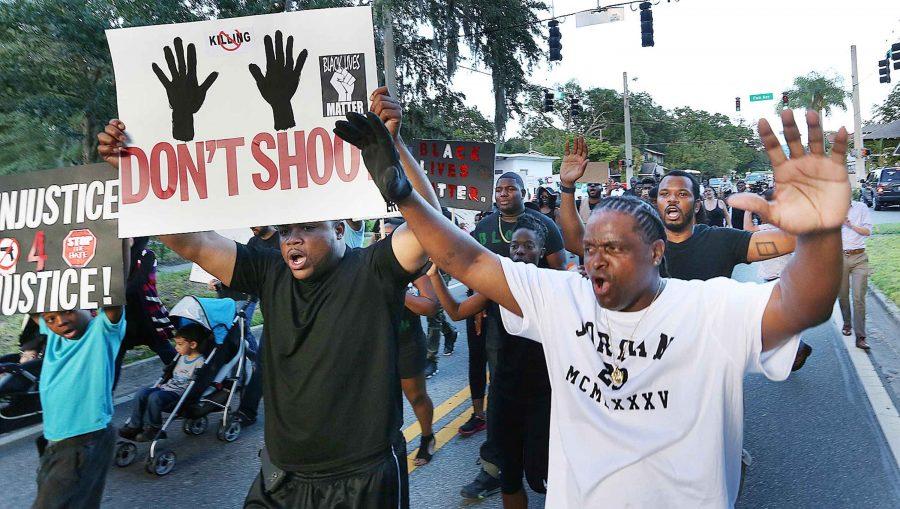SIU community explores #BlackLivesMatter: ‘All lives matter is used to mute black lives matter’
Marchers chant and carry signs in Sanford, Fla., during a Black Lives Matter march and rally on Sunday, July 17, 2016. (Stephen M. Dowell/Orlando Sentinel/TNS)
September 28, 2016
Students and faculty explored the past, present and future of the Black Lives Matter movement as part of the university’s initiative to bridge racial gaps at SIU.
More than 50 students and faculty attended #BlackLivesMatter Explored, part of a Salukis SPEAK series hosted Tuesday night by Student Affairs.
The open discussion encouraged students to express their concerns and emotions about the shootings of African Americans by police officers and cases of racial inequality while also generating solutions to the violence.
Advertisement
The nationally recognized movement — formed in response to the 2012 death of Trayvon Martin after George Zimmerman, the man who shot Martin, was acquitted — is a call to action for racial equality, the prevention of police brutality and all systemic racism toward black people, according to the organization’s website.
Nathan Stephens, director of the Center for Inclusive Excellence, said when he hears the phrase “all lives matter,” he questions the truth behind the saying.
“‘All lives matter’ is used to mute ‘black lives matter,’” he said. “When people say ‘blue lives matter,’ you don’t hear people say ‘all lives matter.’ How can you compare an occupation to an identity? You can take your blue off.”
Stephens said when police are killed, they are given a benefit of the doubt that isn’t given to blacks when they are killed.
“I’m sick and tired of protesting,” said Gabrielle Williams, a graduate student in higher education from St. Louis, who participated in an NAACP march following the death of Michael Brown, who was shot by a police officer in Ferguson, Mo., in August 2014. “We were traveling throughout neighborhoods that didn’t want to confront the racial issues our country faces.”
Kianna Hurd, a senior from St. Louis studying political science, said voting is essential for change.
“Our ancestors died for us to vote,” Hurd said. “The people that are in office are accountable for a lot.”
Advertisement*
The final part of the discussion showed a music video featuring “Be Free,” by J. Cole, which portrayed times of African American hardships throughout history.
“All we want to do is take these chains off … all we want to do is be free,” Cole repeatedly sings.
Donald Chamberlain, a graduate student in social work from Carbondale, said the community needs to start taking action.
“It starts locally and can grown from there,” Chamberlain said. “Getting involved in Carbondale and building a relationship between law enforcement and African Americans is a start.”
Staff writer Tyra Wooten can be reached at [email protected] or on Twitter @twootenDE.
To stay up to date with all your SIU news, follow the Daily Egyptian on Facebook and Twitter.
Advertisement









Frank • Oct 18, 2016 at 7:41 am
Yes, Fannie Lou Hamer and others before her died for African Americans to vote. However your vote cause more harm if you vote for candidates who are so far removed from your issues. Besides, Jill Stein who has a very slim chance of winning because we have a broken political system, there’s no candidates who acknowledge the institutional racism that exists in this country.
If you rewind to the first debate, Clinton stated she would provide funding for police department for training. I don’t think lack of training is the issue. Because we don’t see other races being murdered by the police after having hands raised. Then, Trump stated that he thought stop and frisk was the solution. The solution is to prosecute and sue officers personally; not the city. I am sure that will drastically decrease the murders.